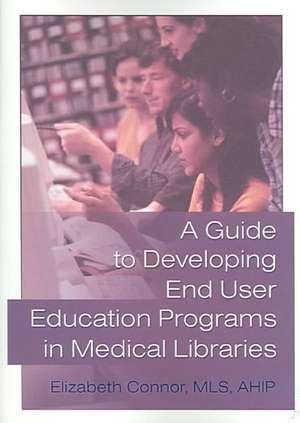A Guide to Developing End User Education Programs in Medical Libraries
Autor Elizabeth Connoren Limba Engleză Paperback – 27 ian 2005
Curricular changes in the health professions, coupled with a growing acceptance of the Internet as a tool for daily living, have contributed to a climate of change and opportunity for health sciences libraries. A Guide to Developing End User Education Programs in Medical Libraries will help graduate students in library science, entry-level medical librarians, and experienced educators to understand best practices and to build, expand, and improve medical library-sponsored educational programs.
A Guide to Developing End User Education Programs in Medical Libraries is designed to aid and inform professionals who develop, teach, or evaluate end-user education programs in health sciences libraries. Eighteen case studies represent the ideas and approaches of more than fifteen private and public institutions in the United States and the Caribbean. The studies focus on effective end-user programs for medical information electives, veterinary medicine programs, health care informatics, and evidence-based medicine, plus instructional programs for teaching residents, ThinkPad-facilitated instruction, and more. The guide also examines how several medical libraries have created and expanded their end-user education programs.
The contributors to A Guide to Developing End User Education Programs in Medical Libraries are health sciences librarians from teaching hospitals, medical/dental/veterinary schools, and health professions-focused universities in a dozen U.S. states and the West Indies. Each of them is involved in designing, teaching, and evaluating user education.
This book will help you educate students of medicine, pharmacy, physical therapy, dentistry, and veterinary medicine, plus residents and practicing health professionals. The educational objectives and approaches in the case studies include:
- clinical medical librarianship
- integrating informatics objectives into curricula
- developing credit and non-credit coursework
- distance learning
- using new and emerging technologies to improve instruction
Let this valuable guide help you—and your institution—take advantage of the opportunities available at this exciting time in the evolution of library science!
Preț: 235.84 lei
Preț vechi: 315.67 lei
-25% Nou
Puncte Express: 354
Preț estimativ în valută:
45.13€ • 47.12$ • 37.35£
45.13€ • 47.12$ • 37.35£
Carte tipărită la comandă
Livrare economică 04-18 aprilie
Preluare comenzi: 021 569.72.76
Specificații
ISBN-13: 9780789017253
ISBN-10: 0789017253
Pagini: 266
Dimensiuni: 152 x 212 x 19 mm
Greutate: 0.5 kg
Ediția:1
Editura: Taylor & Francis
Colecția Routledge
Locul publicării:Oxford, United Kingdom
ISBN-10: 0789017253
Pagini: 266
Dimensiuni: 152 x 212 x 19 mm
Greutate: 0.5 kg
Ediția:1
Editura: Taylor & Francis
Colecția Routledge
Locul publicării:Oxford, United Kingdom
Cuprins
- About the Editor
- Contributors
- Preface
- Introduction
- Chapter 1. Computers & Medical Information Elective at Texas A&M University (Gale G. Hannigan)
- Setting
- Educational Approaches
- Evaluation Methods
- Future Plans
- Conclusion
- Appendix A: Computers & Medical Information Elective (IMED-989301) 2003-2004 Modules
- Appendix B: Computers & Medical Information Elective (IMED-989301) Evaluation
- Chapter 2. Instructional Outreach and Liaison to a Veterinary Medicine Program at Washington State University (Sarah K. McCord and Vicki F. Croft)
- Setting
- Educational Approaches
- Evaluation Methods
- Conclusion
- Chapter 3. Researching the Evidence in Physical Therapy at the University of Missouri-Columbia (Rebecca S. Graves, Evan Prost, and Yvette Silvey)
- Setting
- Background
- Educational Approaches
- Evaluation Methods
- Future Plans
- Conclusion
- Chapter 4. The Librarian As Partner in the Development of the Health Care Informatics Curriculum at James Madison University (Jennifer McCabe)
- Setting
- Educational Approaches
- Evaluation Methods
- Conclusion
- Appendix: Informatics for Health Care Professionals Syllabus
- Chapter 5. Educating Users of the Health Sciences Library System at the University of Pittsburgh (Linda M. Hartman)
- Setting
- Educational Approaches
- Evaluation Methods
- Conclusion
- Chapter 6. Hardin Library for the Health Sciences: Experiencing Change (Denise H. Britigan
and Anne K. Gehringer) - Introduction
- Setting
- Background
- Educational Approaches
- Evaluation Methods
- Conclusion
- Chapter 7. Medical Informatics Intervention: Teaching the Teaching Residents at Christiana Care Health System (Sharon Easterby-Gannett and Ellen M. Justice)
- Setting
- Educational Approaches
- Evaluation Methods
- Future Plans
- Conclusion
- Appendix: Findings from the Teaching Resident Block: Pre- and Postinformatics Rating Scale
- Chapter 8. The Librarian’s Role As Information Technology Educator at the University of South Alabama (Justin Robertson)
- Introduction
- Setting
- Educational Approaches
- Evaluation Methods
- Conclusion
- Appendix A: College of Medicine Elective FMP 479
- Appendix B: Basic Personal Computer Confidence Survey (BBL 479)
- Chapter 9. Using Computer-Based Case Studies for Developing Information Searching Skills and Implementing Evidence-Based Medicine at Jefferson Medical College (Anthony J. Frisby and Daniel G. Kipnis)
- Introduction
- Setting
- Educational Approaches
- Support Issues
- Evaluation Methods
- Future Plans
- Chapter 10. Education and E-Learning at the William H. Welch Medical Library (Cynthia L. Sheffield, Jayne M. Campbell, and Dongming Zhang)
- Introduction
- Setting
- Educational Approaches
- Future Plans
- Conclusion
- Chapter 11. An Information Course for First-Year Pharmacy Students at the University of California, San Francisco (David J. Owen, Gail L. Persily, and Patricia C. Babbitt)
- Introduction
- Setting
- Educational Approaches
- Evaluation Methods
- Conclusion
- Chapter 12. Building an Effective User Education Program: The Medical Librarian As Coeducator at the University of the West Indies (Ernesta Greenidge and Meerabai Gosine-Boodoo)
- Setting
- Educational Approaches
- Evaluation Methods
- Future Plans
- Conclusion
- Chapter 13. Educational Programs at the New York University College of
Descriere
Selected for inclusion in Doody's Core Titles in the Health Sciences, 2005 edition (DCT), this book is designed to aid and inform professionals who develop, teach, or evaluate end-user education programs in health sciences libraries. Eighteen case studies look at successful effective end-user programs for medical information electives, veterinary medicine programs, health care informatics, and evidence-based medicine, plus instructional programs for teaching residents, ThinkPad-facilitated instruction, and more. The guide also examines how several medical libraries have created and expanded their end-user education programs.
